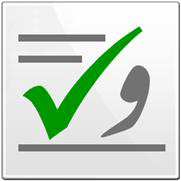
Harvesting the wisdom of ALLi editors
We asked some highly experienced editors among ALLi membership to nominate one top tip that they would like to share with indie authors – whether the nugget they find themselves dishing out most often to their clients, or a single transformative piece of advice they wish everyone would take.
And if you'd like to find a great editor to help you with your work-in-progress, you'll find a list of our tried-and-trusted partner members who specialize in editing in our Self-publishing Services Directory, accessible online here.
Editors' Top Tips
Differentiate between dialogue tags and action tags – Courtney Cannon
Proper dialogue tags can save you a fortune! I often get editing queries from first-time authors who don't understand dialogue formatting. I'll return the manuscript sample and instruct the author to please correct those errors before resubmitting the document for consideration. Dialogue is a huge part of any fiction book and changing every single piece of dialogue is time-consuming and takes away an editor's focus from the main aspects of the story. So my advice is: “Please brush up on dialogue formatting including learning which things should be dialogue tags and which should be action tags. You can't smile, choke, or chuckle a reply.”
Read your manuscript aloud when you self-edit – Amie McCracken
Your brain is trained to skip over a lot of the letters and words when you read silently, so reading out loud will help you catch mistakes and also stilted language and awkward dialogue.
Confirm each item's purpose – Dan Holloway
Ask yourself “What is this scene (line/piece of dialogue) doing? What purpose does it serve?”
And if you can't really answer that question, cut it, because if you don't know, your reader sure as anything is going to be confused.
Start where the story starts – Richard Bradburn
The story doesn’t start with the character waking up, or having breakfast, or going to work. Your story does start, most likely, with one incident that sets off the chain reaction which is the sequence of events that form your story. It needn’t be an explosion or a gun-fight. It could be eyes meeting in a crowded train carriage. It could be spilling coffee over someone’s laptop in a coffee-shop. It could be a mosquito bite in a malarial swamp. Whatever it is, try and start with that incident. I don’t like rules in fiction, but really, that incident has to be in the first chapter. If it’s on the first page, even better. If it’s the first line, outstanding!
Don't over-write – Ann Richardson
Less is more. How many extraneous words could be removed? In short, don't over-write. (I could write more, but I'm practising what I preach here!)
Give it some space – Jules Frusher
Leave your completed draft at a week or so if possible before you start self-editing. Then read through aloud.
Beware of overused phrases – Katharine E Smith
Just like in speech, people often use the same phrase over and over again in their writing. It often takes a fresh pair of eyes to spot this, and reading out loud is a great idea. It's sometimes easier to hear these things.
Check the consistency of your characters' names – Alison Jack
A simple piece of advice I find myself giving fairly regularly is to make sure characters’ names don’t change. This can be quite subtle, eg Tracey becomes Tracy or Stephen becomes Steven, or it can be a complete change, eg the lead character’s mum is called Caroline in early chapters, but she’s Dora later in the book. (That’s a real example from a book I read that quite clearly hadn’t been properly edited!)
Listen to your characters – John Lynch
Your characters will talk to you. Listen to them. If they think you've got the tone wrong, you've got the tone wrong.
Keep it credible – Helen Baggott
Even incredible plots need to be credible. Science fiction, fantasy, etc. need to have a nugget of something your reader can accept – even if it's a minor detail. How you introduce that credibility is a skill in itself. Followers of your genre will have expectations and there’s nothing more critical than a disappointed reader.
Slow down – Averill Buchanan
Be prepared to go through many drafts before arriving at a version that's ready to be published. It's the time in between each draft that's important. It gives you the distance from your own work to help you be more objective about it.
Check your tenses – Kim Lambert
Actually, this is a two-part thing – part one is where authors have tense inconsistency within a single sentence (which confuses the reader) and part two is the fact that the word ‘had' appears to be disappearing from the language. It joins a long list of words (that, of etc) that are being slowly killed off. Whilst their overuse is also bad, leaving them out completely makes for confusing sentences.
Vary your sentence length – Keith Dixon
Have short and long sentences in any given paragraph. Like this. You don't have to alternate them, but be aware of droning on with the same length sentences all the time. A series of short sentences is just as bad. (See the later works of James Ellroy.)
Be orderly – Jules Horne
Break up the paras and make sure each para has a distinct focus. Don't tangle everything up together unless you're writing something experimental and want to fry the reader's brain.
Focus on one reader, not many – Boni Wagner-Stafford
This is simple but I think important, especially for the nonfiction I edit. Talk to ONE reader, not many. Don’t say this: “You are all probably sitting down reading this…” instead do say, “You’re probably sitting down reading this…” people read books in an individual endeavor, not as a group, however much authors may want to imagine their book being read by the masses!
Learn from your mistakes – Alex McGilvery
Use your mistakes in your draft as cues to what needs to be fixed. Adverbs are telling you to use stronger verbs and develop the action more. Too many different speech tags suggest you need beats. Stop the story dead exposition is probably dead wood, look for where you have integrated the information in the story organically.
Trust the reader. (I think of this in Obi-Wan's voice)
Hire a good line editor – Tahlia Newland
Hire someone who specializes in improving prose – at least once in your career. I think some authors are scared that line editors will change their voice or style – and some might, which is why you get a sample edit before taking them on – but a good line editor actually strengthens voice. You can learn heaps from hiring such an editor on just one book. After you've learned where your bad habits are, you can correct them in future and go back to only having a copy editor. If you couldn't afford having the whole book done, just do a section – you'll still learn a lot from the process.
Don't forget to read! – Roz Morris
If you're writing novels, read a lot of novels. Although movies will teach you some aspects of storytelling, they won't teach you about the strengths or magic of prose. And some tricks you can do in movies simply don't work in prose!
Do what you can yourself before sending your manuscript to your editor – Suzie Grogan
Don't send it to an editor before you are completely happy with it yourself, and have followed all the tips above. Editing is a necessary (and I would say vital) expense to get the very best from your work, but you don't want to spend money highlighting faults you knew were there already.
A Final Thought about Readers
 Read your manuscript like a reader – David Penny
Read your manuscript like a reader – David Penny
This is one of the hardest of all, but always try to do one pass reading like a reader, not the person who wrote it. And do this fast, like you would any other book.
After all, isn't getting it right for our readers what editing is all about?
OVER TO YOU If you're an editor, what's your top tip for indie authors? And if you're an author, what's the most valuable piece of advice you've been given by your editor?
#Editing wisdom from the ALLi hive mind: a handy checklist of simple but effective top tips from professional editors to help #indieauthors make their books the best they can be #ww #amediting Share on XOTHER GREAT POSTS ABOUT ASPECTS OF EDITING
From the ALLi Author Advice Center Archive




